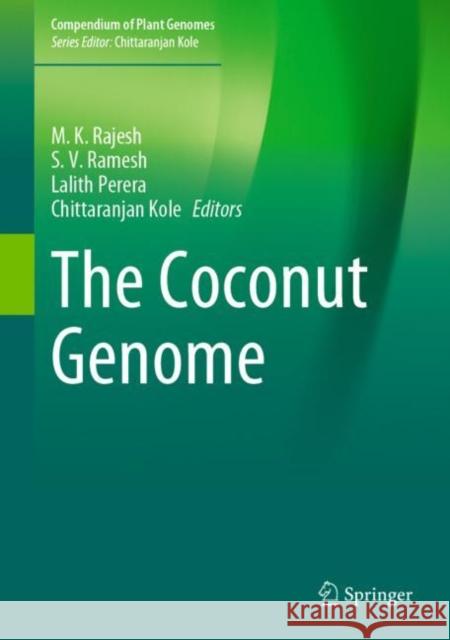The Coconut Genome » książka



The Coconut Genome
ISBN-13: 9783030766481 / Angielski / Twarda / 2021 / 209 str.
The Coconut Genome
ISBN-13: 9783030766481 / Angielski / Twarda / 2021 / 209 str.
(netto: 651,74 VAT: 5%)
Najniższa cena z 30 dni: 655,41
ok. 16-18 dni roboczych.
Darmowa dostawa!
Chapter 1. World Economic Importance.- Chapter 2. Botanical Study and Cytology.- Chapter 3. Germplasm Resources: Diversity and Conservation.- Chapter 4. Breeding Strategies.- Chapter 5. Characterization of Genetic Diversity Using Molecular Markers.- Chapter 6. Quantitative Trait Loci (QTL) and Association Mapping for Major Agronomic Traits.- Chapter 7. Palms in an ‘OMICS’ Era.- Chapter 8. Genome Sequencing, Transcriptomics, Proteomics and Metabolomics.- Chapter 9. Mitochondrial and Chloroplast Genomes.- Chapter 10. Endosperm Oil Biosynthesis: A Case Study for Trait Related Gene Evolution in Coconut.- Chapter 11. Aroma and Fragrance: A Case Study for Trait-Related Gene Evolution in Coconut.- Chapter 12. Resistance Gene Candidates (RGCs) in Coconut Palm: A Molecular Platform for the Genetic Improvement of Resistance to Pathogens.- Chapter 13. Epigenetics of Coconut Endosperm Development.- Chapter 14. Genome Editing: Prospects and Challenges.- Chapter 15. Coconut: The Tree Of Life- Endless Possibilities.
Dr. M.K. Rajesh is serving as Principal Scientist (Biotechnology) in the Division of Crop Improvement, ICAR-CPCRI. He obtained his B.Sc (Agriculture), M.Sc (Biotechnology) and Ph.D (Biotechnology) from Tamil Nadu Agricultural University, Coimbatore, India. He has over 21 years experience in molecular characterization of coconut, cocoa and arecanut germplasm, use of molecular markers for hybrid authentication in coconut and arecanut, in vitro culture and in vitro conservation of coconut. His current area of research includes genome, transcriptome, proteome and metabolome analyses of coconut, with special focus on somatic embryogenesis and host-pathogen interactions. He has published more than 100 research papers in peer reviewed journals, written over 30 book chapters and edited five books. He is also serving as Editor, Journal of Plantation Crops.
Dr. Ramesh S.V. is currently serving as Senior Scientist (Biotechnology), at ICAR-Central Plantation Crops Research Institute (ICAR-CPCRI), Kasaragod, Kerala, India. His field of specialization is plant molecular biology and biotechnology having obtained his Masters and Doctorate degrees in Plant Biochemistry. Ramesh is a recipient of DBT-CTEP Travel Award (2013) and AABSc-sponsored Young Plant Biotechnologist Award (2015). He did his post-doctoral research work in the field of small non-coding RNAs at Washington State University, USA under DBT-CREST Fellowship (2013-14). He has authored many scholarly articles- spread over diverse fields viz., plantation biology, plant-virus interactions, and nutrition biochemistry- in the journals of international and national repute and presented his research findings in several international scientific fora. Currently his research areas of focus include transcriptomics (non-coding RNAs) of abiotic stressors and lipid biochemistry of plantation crops. He also features in the list of Academic Editors of Journal PLOS ONE.
Dr. Lalith Perera represents Coconut Research Institute of Sri Lanka (CRI) since 1990, and currently serves as Institute’s Additional Director. He was the former Deputy Director (Research) and the former Head of the Genetics and Plant Breeding Division of the CRI. He was the former Chairman of the Steering Committee of the Coconut Genetic Resecures Network (COGENT) and currently a member of the Technical Working Group of the International Coconut Community (ICC). His research work has earned him numerous awards including the Presidential Research Award (Sri Lanka), Endeavor Research Fellowship (Australia), Scholarship from Commonwealth Universities to pursue his PhD in UK and Visiting Scientist Fellowship (FAO). He has authored and co-authored close to 100 publications, book chapters, scientific communications, and conference/workshop proceedings.
Prof. Chittaranjan Kole is an internationally acclaimed scientist with an illustrious professional career of spanning over thirty-six years and original contributions in the fields of plant genomics, biotechnology and molecular breeding leading to the publication of more than 150 quality research articles and reviews. He has edited over 130 books and his contributions and editing acumen have been appreciated by seven Nobel Laureates including Profs. Norman Borlaug, Arthur Kornberg, Werner Arber, Phillip Sharp, Günter Blobel, Lee Hartwell and Roger Kornberg. He has been honored with a number of Fellowships, national and international awards including the Outstanding Crop Scientist Award conferred by the International Crop Science Society. He has served in the academia as Vice-Chancellor BC Agricultural University, Project Coordinator of Indo-Russian Center of Biotechnology in India, Director of Research of Institute of Nutraceutical Research of Clemson University, USA and as a Visiting Professor in the Pennsylvania State University and Clemson University, USA. In the recent past, he was awarded with the Raja Ramanna Fellow by the Department of Energy, Government of India. He holds the Presidentship of International Climate-Resilient Crop Genomics Consortium and International Phytomedomics and Nutriomics Consortium.
This book serves as the first comprehensive compilation describing the breeding strategies and genetics and genomics of the coconut palm. It describes gene evolution of economically important traits such as oil biosynthesis, aroma and fragrance, disease-resistant genes and small RNAs-mediated gene regulation of coconut. Application of “omics” approaches in palms and the prospects of genome editing technologies in coconut are also discussed. The author list includes pioneers and experts in the field of coconut genomics.
The book appeals to postgraduate students, researchers and industry players in the field of plantation crops in general and coconut in particular.
1997-2026 DolnySlask.com Agencja Internetowa
KrainaKsiazek.PL - Księgarnia Internetowa









